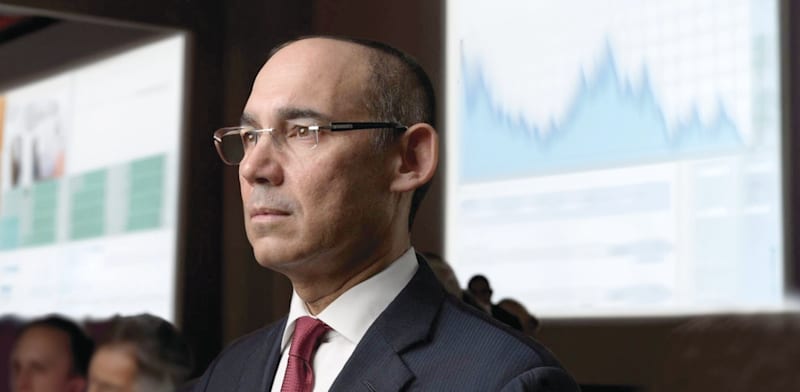Listen to the article
Dive Brief:
A federal judge has ordered leaders at the University of South Dakota to temporarily reinstate Phillip Michael Hook, a tenured art professor it sought to fire over a social media post critical of Charlie Kirk.
On Sept. 12, the university notified Hook he would be placed on administrative leave and that it intended to terminate his contract over a private Facebook post he shared criticizing Kirk the day of the conservative firebrand’s killing.
Hook is suing university leaders, alleging they unconstitutionally retaliated against him over his political speech. The professor’s case has a “fair chance of prevailing,” U.S. District Judge Karen Schreier said Wednesday in granting the temporary restraining order.
Dive Insight:
Hook is just one of an increasing number of college employees who have been reprimanded or fired over their speech about Kirk following his killing on Sept. 10. And a growing number of the educators affected are taking their cases to court. Schreier’s ruling this week represented one of the first court actions in such a lawsuit.
The federal judge said Hook must prove he made his comments as a citizen on “a public matter of concern” and that the University of South Dakota’s actions came as a result of that speech.
Hours after Kirk was killed, Hook said on his private Facebook account that he had no “thoughts or prayers” for Kirk.
In 2012, Kirk founded Turning Point USA, a conservative advocacy group geared toward young people, and became a prominent figure on college campuses in the process. Many of his political beliefs — such as opposition to race-conscious college admissions and gun control — fell in line with those of the conservative movement more broadly.
But his comments on some issues regularly prompted significant outcry and backlash, such as when he called Supreme Court Justice Ketanji Brown Jackson a “diversity hire” and said “prowling Blacks go around for fun to go target White people.” He also espoused the great replacement theory, which labels immigration policies as part of a plot to undermine the power and influence of White people.
“I’m sorry for his family that he was a hate spreading Nazi and got killed. I’m sure they deserved better,” Hook said in his Facebook post. “But geez, where was all this concern when the politicians in Minnesota were shot? And the school shootings? And Capitol Police?”
A few hours later, Hook deleted the post and shared “a public apology to those who were offended” by it on the same account. He published both posts while he was off work, according to court documents.
However, Hook’s original comments gained significant attention after conservative politicians shared a screenshot of them online.
Jon Hansen, the Republican speaker for South Dakota’s House and a 2026 candidate for governor, on Sept. 12 called Hook’s speech disgusting and “unbecoming of someone who works for and represents our University.”
“Yesterday, after seeing the post, I immediately reached out to USD President Sheila Gestring and called on the professor to be fired. I understand that the professor is likely to be terminated from his position,” Hansen said on social media.
A few hours later, South Dakota Gov. Larry Rhoden said Hook’s post made him “shaking mad” and that the South Dakota Board of Regents intended to fire the professor, a decision he applauded.
The same day, Hook received a letter from Bruce Kelley, the university’s fine arts dean, notifying him of the university’s “intent to terminate” his employment.
The letter alleged that Hook had violated two university policies, according to court documents.
One bans “neglect of duty, misconduct, incompetence, abuse of power or other actions” that diminish trust in faculty or prevent them from doing their job. The other requires that faculty “at all times be accurate, show respect for the opinions of others and make every effort to indicate when they are not speaking for the institution.”
University of South Dakota officials said this week that, over the two days between Hook’s post and Kelley’s letter, the university and the South Dakota Board of Regents received hundreds of messages criticizing Hook’s comments and calling for his removal. They confirmed that one such call came from Hansen.
However, the federal judge who ordered Hook’s temporary reinstatement said the officials failed to show that the reaction to the professor’s private comments disrupted his lessons or the university’s operations.
The Sept. 12 letter “identifies Hook’s social media post as the single piece of evidence it used to support its decision to terminate Hook’s position,” Schreier wrote.
Kelley had placed Hook on administrative leave until Sept. 29, when a personal conference was to be held to “discuss this matter and intended disciplinary action.”
Hook sued Kelley and Gestring, along with board president Tim Rave, on Tuesday seeking to have their decision ruled unconstitutional.
Schreier’s order will remain in effect until Oct. 8, when the court is scheduled to hear arguments over a more permanent preliminary injunction. The temporary restraining order allows for the Sept. 29 meeting to still occur, should the defendants choose.





























